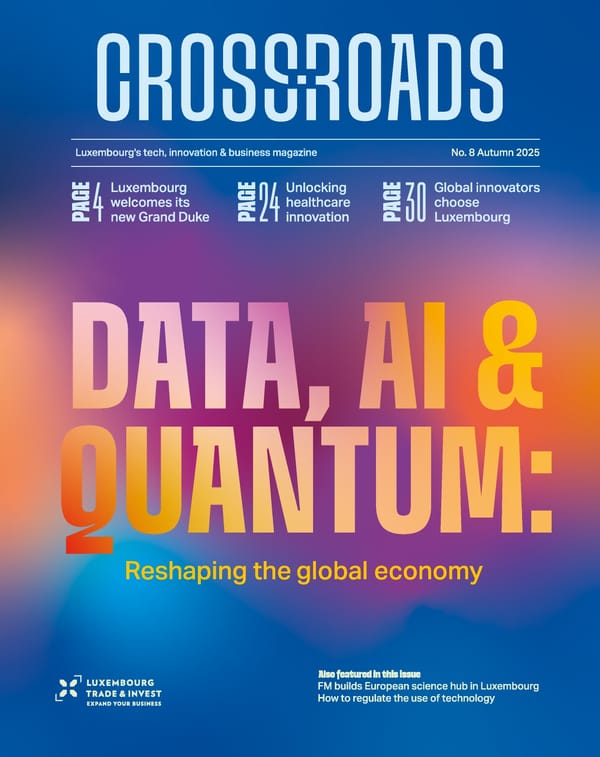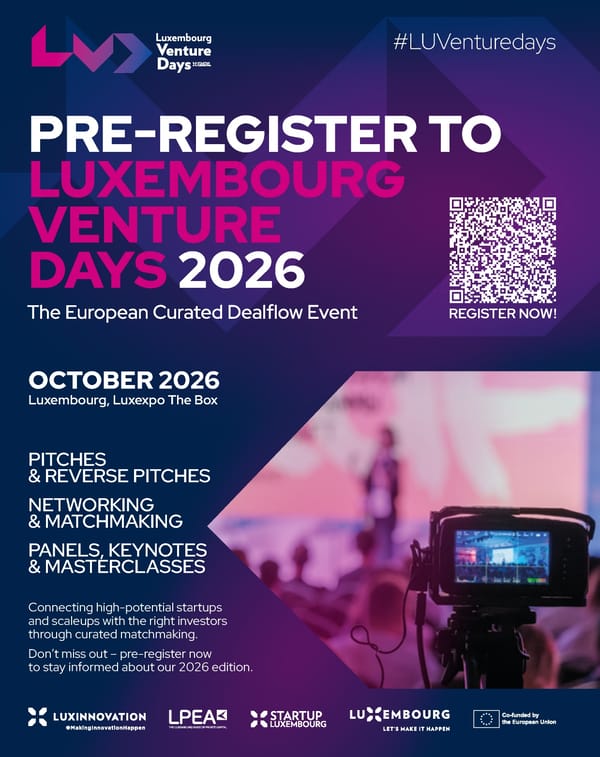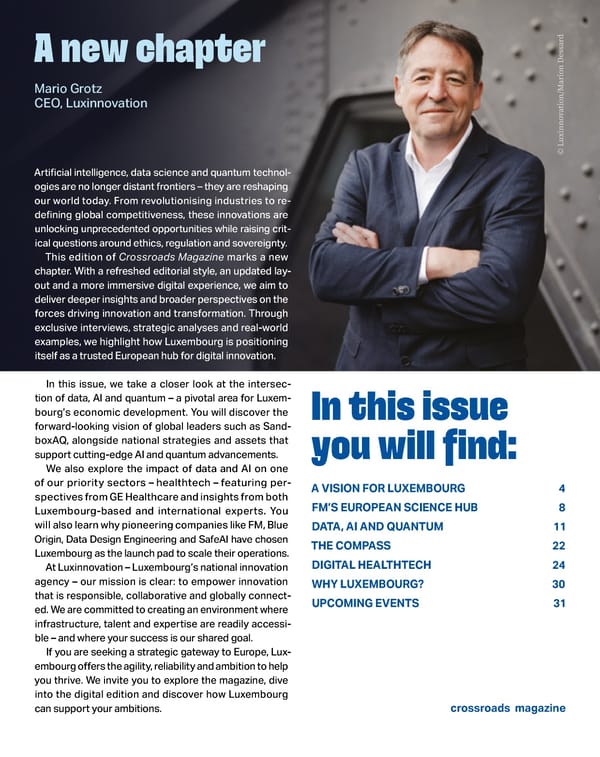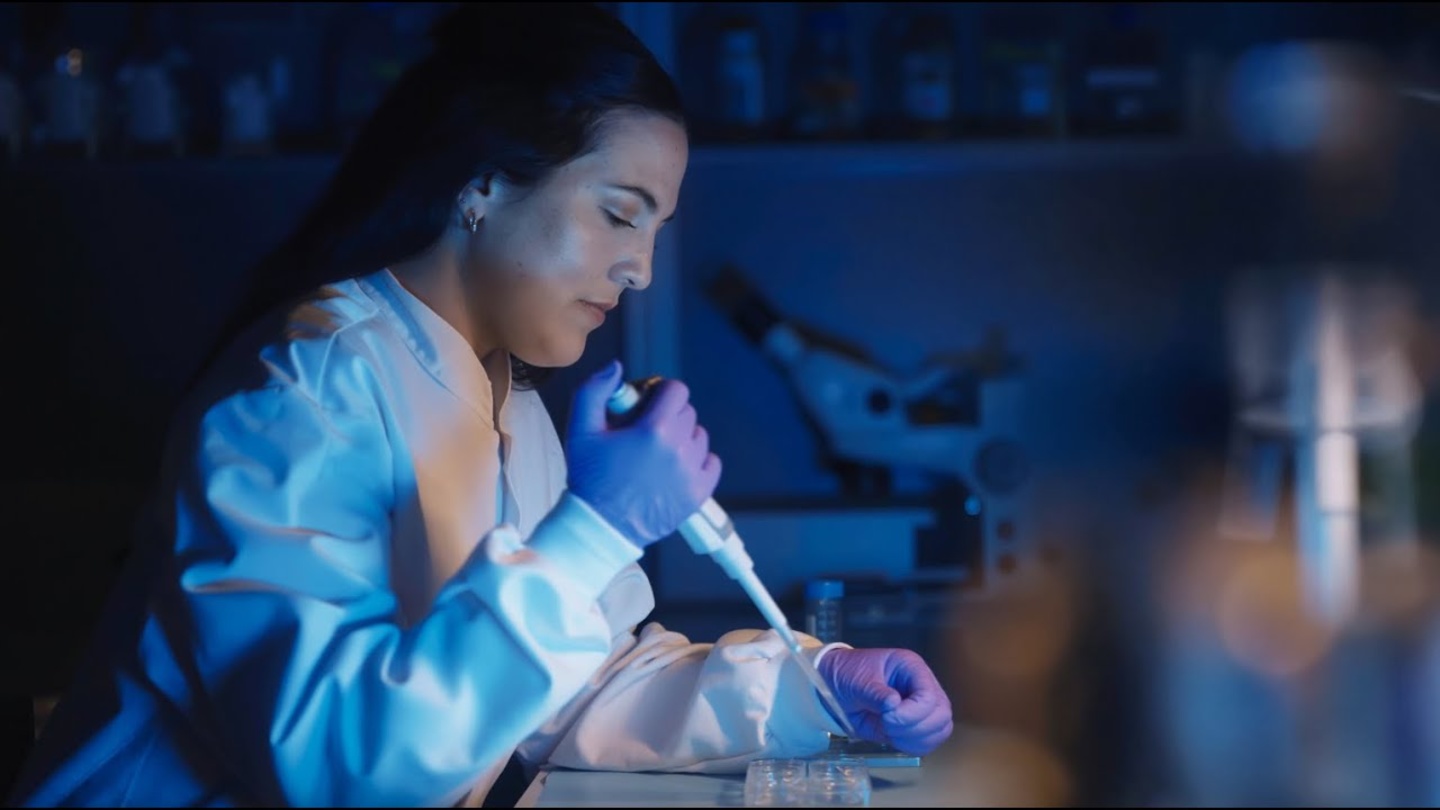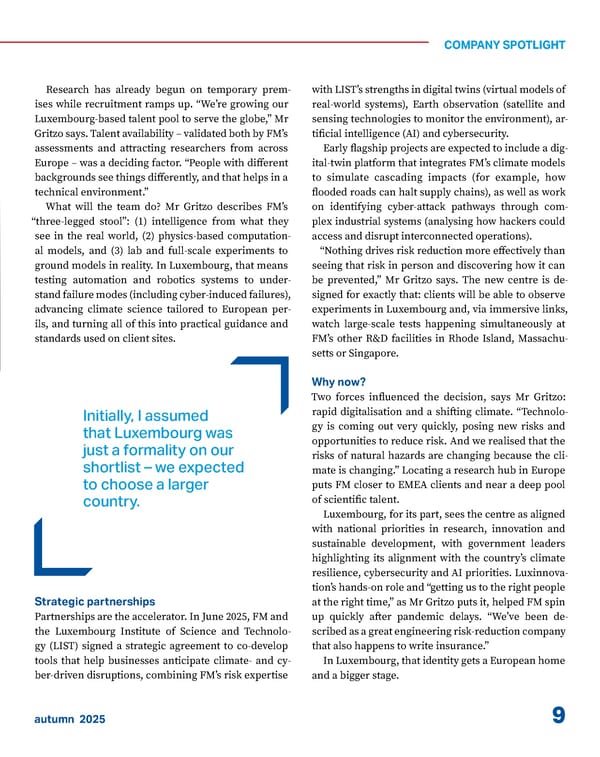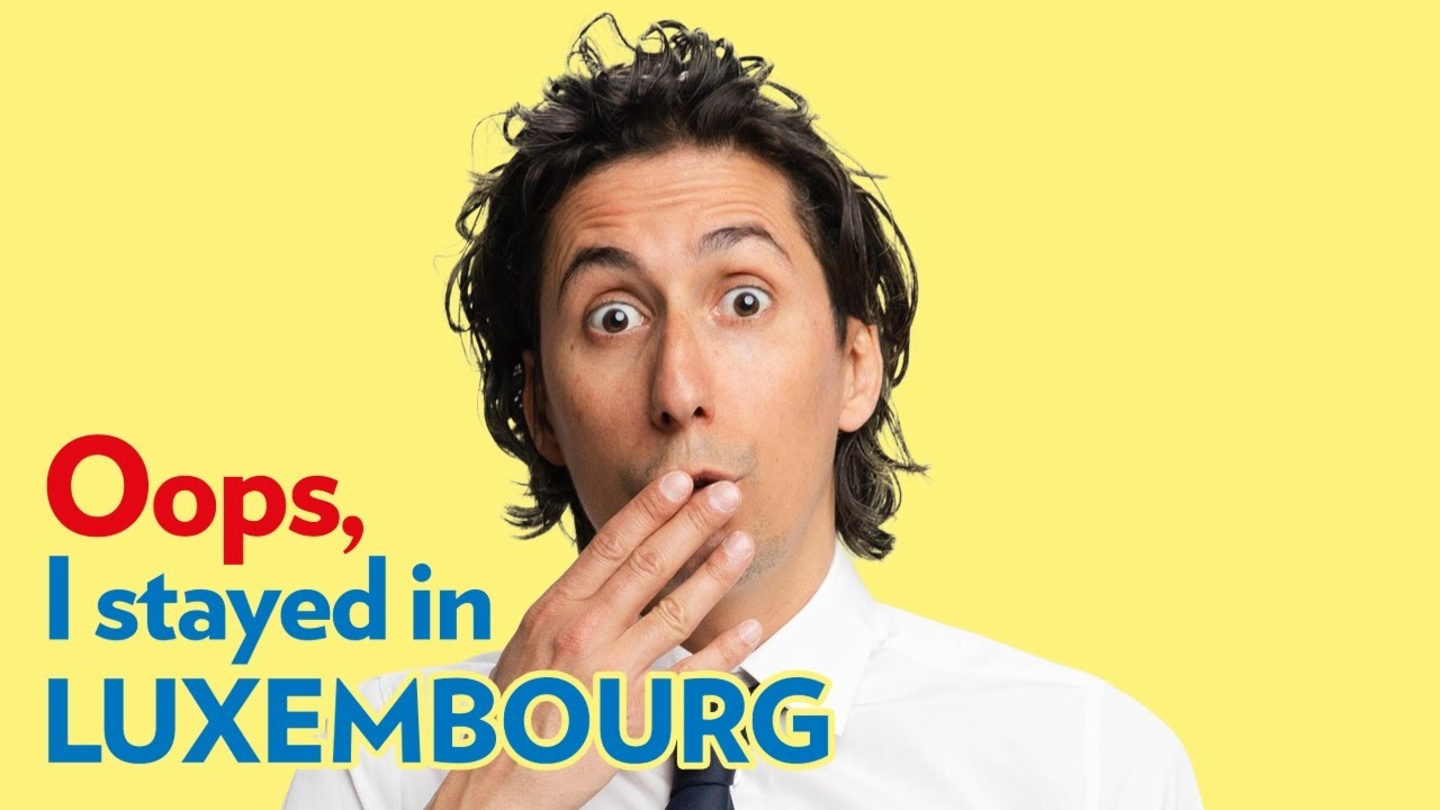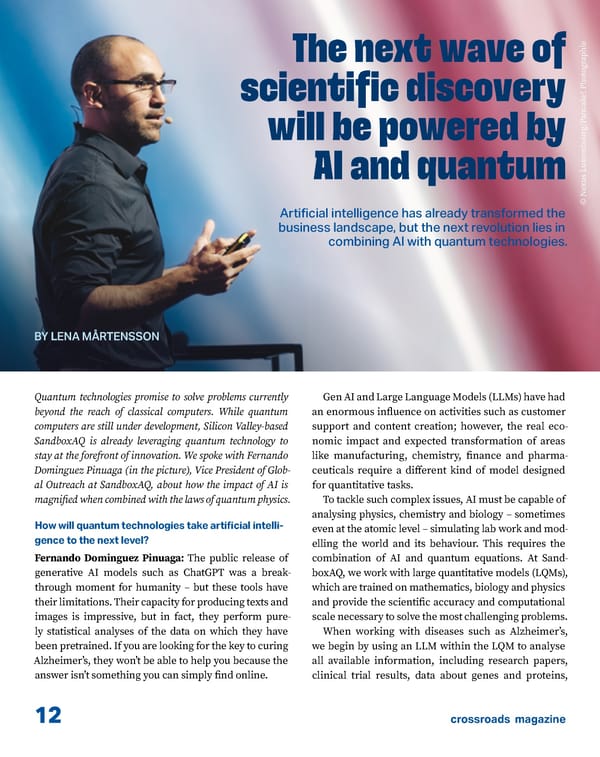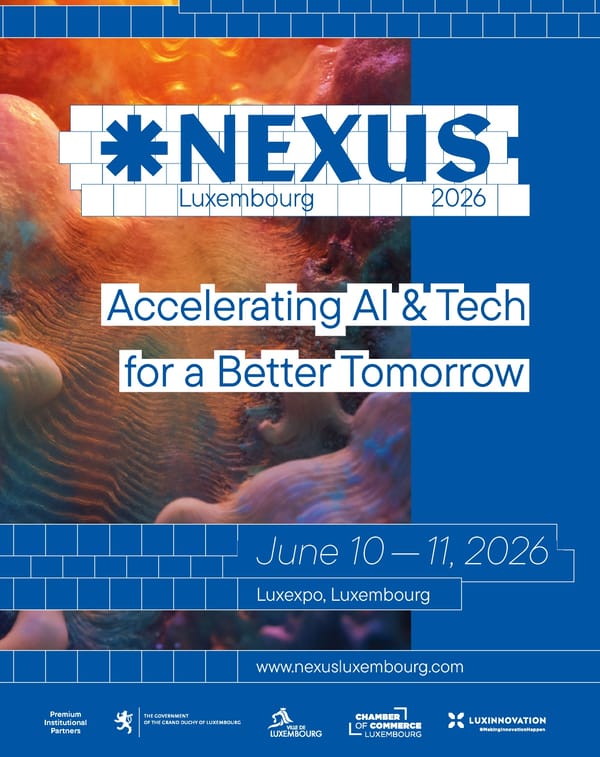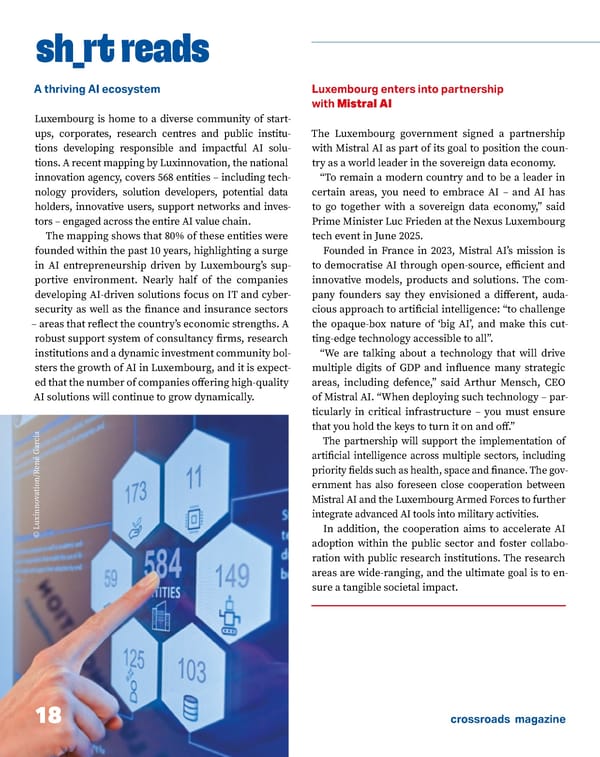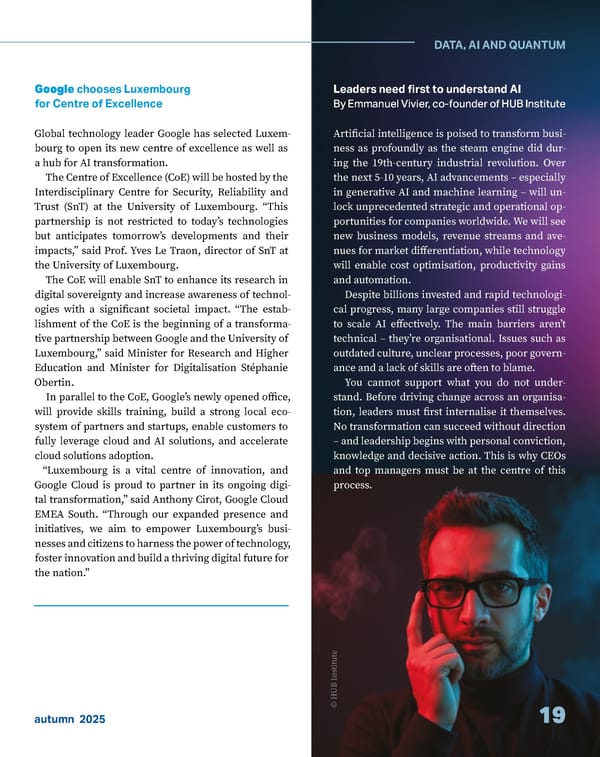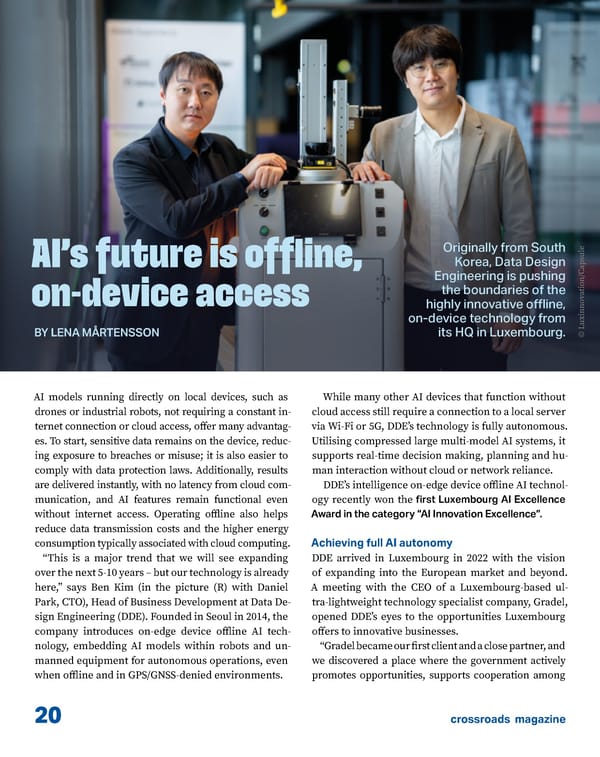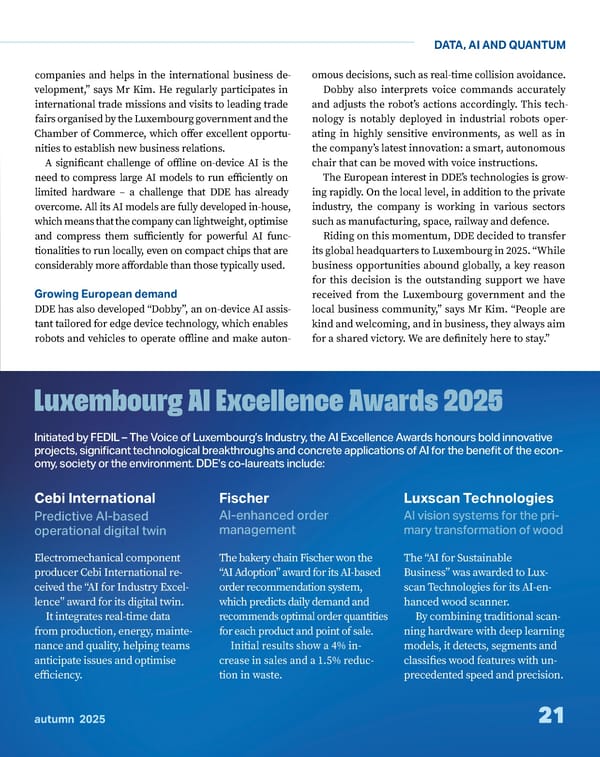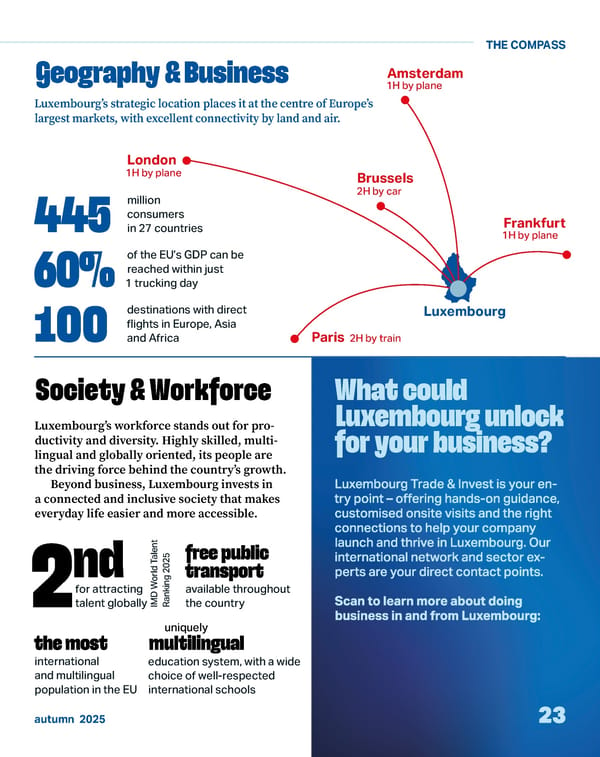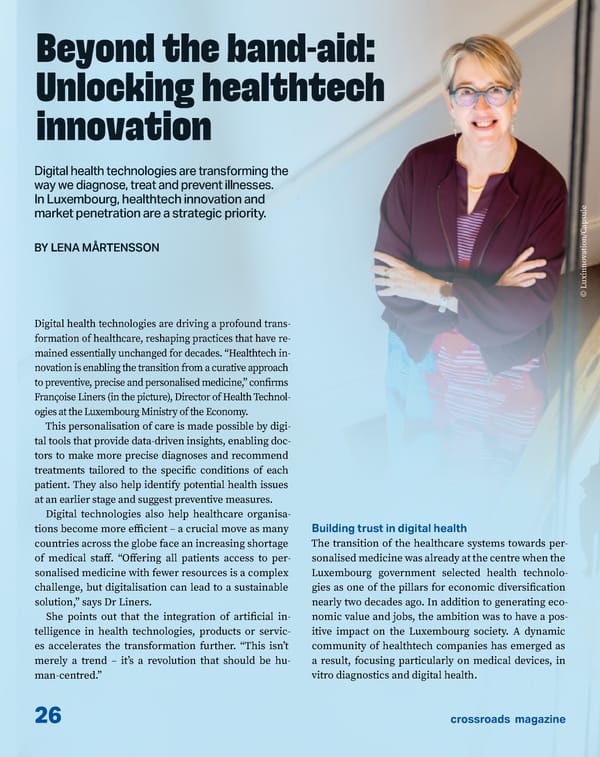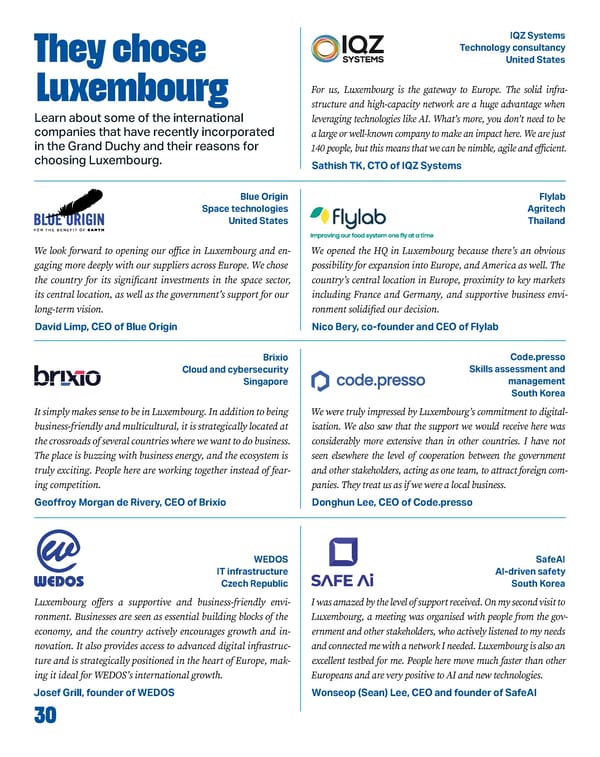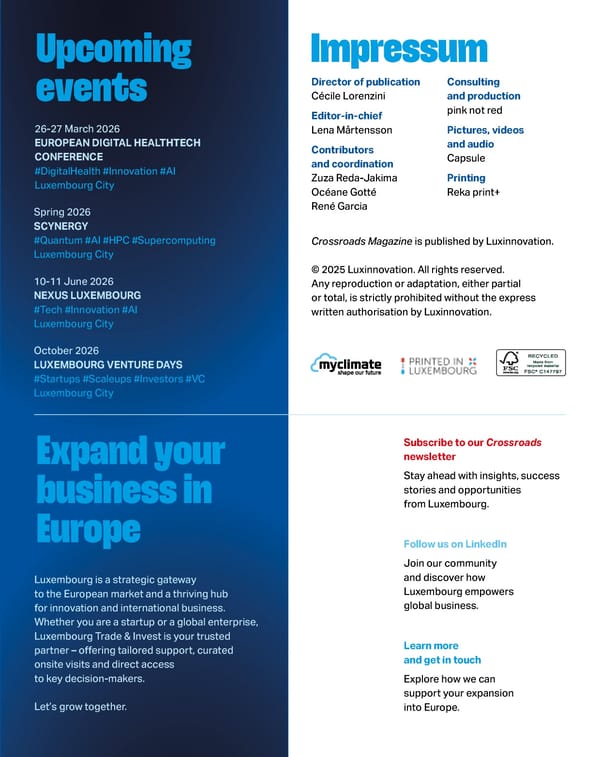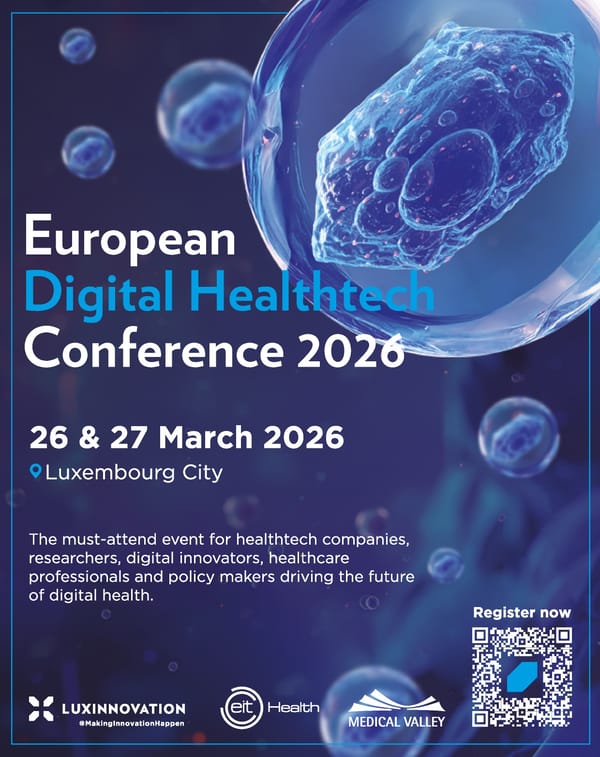Crossroads: Data, AI & Quantum - Reshaping the Global Economy
This issue of Luxembourg's tech, innovation, and business magazine explores the transformative impact of data, AI, and quantum technologies on global economic structures.
PITCHES & REVERSE PITCHES NETWORKING & MATCHMAKING PANELS, KEYNOTES & MASTERCLASSES Connecting high-potential startups and scaleups with the right investors through curated matchmaking. Don’t miss out – pre-register now to stay informed about our 2026 edition. Luxembourg, Luxexpo The Box OCTOBER 2026 #LUVenturedays REGISTER NOW! PRE-REGISTER TO LUXEMBOURG VENTURE DAYS 2026
Artificial intelligence, data science and quantum technol - ogies are no longer distant frontiers – they are reshaping our world today. From revolutionising industries to re - defining global competitiveness, these innovations are unlocking unprecedented opportunities while raising crit - ical questions around ethics, regulation and sovereignty. This edition of Crossroads Magazine marks a new chapter. With a refreshed editorial style, an updated lay - out and a more immersive digital experience, we aim to deliver deeper insights and broader perspectives on the forces driving innovation and transformation. Through exclusive interviews, strategic analyses and real-world examples, we highlight how Luxembourg is positioning itself as a trusted European hub for digital innovation. In this issue, we take a closer look at the intersec - tion of data, AI and quantum – a pivotal area for Luxem - bourg’s economic development. You will discover the forward-looking vision of global leaders such as Sand - boxAQ, alongside national strategies and assets that support cutting-edge AI and quantum advancements. We also explore the impact of data and AI on one of our priority sectors – healthtech – featuring per - spec tives from GE Healthcare and insights from both Luxembourg-based and international experts. You will also learn why pioneering companies like FM, Blue Origin, Data Design Engineering and SafeAI have chosen Luxembourg as the launch pad to scale their operations. At Luxinnovation – Luxembourg’s national innovation agency – our mission is clear: to empower innovation that is responsible, collaborative and globally connect - ed. We are committed to creating an environment where infrastructure, talent and expertise are readily accessi - ble – and where your success is our shared goal. If you are seeking a strategic gateway to Europe, Lux - embourg offers the agility, reliability and ambition to help you thrive. We invite you to explore the magazine, dive into the digital edition and discover how Luxembourg can support your ambitions. A VISION FOR LUXEMBOURG FM’S EUROPEAN SCIENCE HUB DATA, AI AND QUANTUM THE COMPASS DIGITAL HEALTHTECH WHY LUXEMBOURG? UPCOMING EVENTS Mario Grotz CEO, Luxinnovation crossroads magazine 4 8 11 22 24 30 31 © Luxinnovation/Marion Dessard
4 crossroadsmagazine A VISION FOR LUXEMBOURG © Maison du Grand-Duc/Kary Barthelmey
5 autumn2025 Your Royal Highness, you have represented Luxem- bourg’s economy for 25 years. How do you look back on this journey? H.R.H. the Grand Duke: These 25 years have been a journey of service and gratitude, one that showed me how deeply Luxembourg’s openness inspires trust and collaboration around the world. Every mission and every encounter has been an opportunity to witness A nation’s strength lies not in its size, but in its ability to connect. Few embody this principle more fully than Lux- embourg, a country whose openness to the world is both a source of prosperity and a reflection of its character. At the heart of this story stands Grand Duke Guillaume, whose 25 years of economic diplomacy have helped build Luxem- bourg’s bridges across continents. On 3 October 2025, His Royal Highness Grand Duke Guil- laume acceded to the throne, bringing with him more than two decades of experience promoting Luxembourg’s econo- my on the global stage. His path from Crown Prince to Head of State has been marked by a deep sense of service to his country, its people and its place in the world. As Honorary President of the Luxembourg Trade & In- vestment Board – a high-level platform uniting government, business and innovation leaders – the Grand Duke has long been at the forefront of Luxembourg’s economic diplomacy. The Board coordinates the country’s international promo- the creativity, determination and talent of our entre- preneurs and skilled workforce. Promoting Luxembourg abroad has never been solely about economic diplomacy. It has also always been about human connections. Our success is built on trust, enduring partnerships, and a shared belief that even small nations like ours can have a global im- pact when we act with integrity, openness and vision. tion strategy and supports sustainable growth by helping companies expand abroad or invest in the Grand Duchy. During his 25 years of service as Crown Prince, His Royal Highness played a leading role in promoting Luxembourg’s economy abroad. He led seventy trade and economic mis- sions organised by successive governments and the Cham- ber of Commerce, opening new markets for Luxembourg’s businesses and introducing global investors to the coun - try’s unique advantages including stability, innovation and a spirit of cooperation. Through these missions, he helped strengthen Luxembourg’s reputation as a trusted and forward-looking partner at the heart of Europe. Now, at 43 years old, Grand Duke Guillaume brings this wealth of experience to a new chapter of national leadership. In this feature, he offers insights into 25 years of building bridges – between nations, people and ideas – and explores how Luxembourg’s enduring openness con- tinues to define its role. His Royal Highness Grand Duke Guillaume reflects on 25 years of promoting Luxem - bourg’s economy, its unique openness to the world, and the enduring values that guide the Grand Duchy. A VISION FOR LUXEMBOURG
6 crossroadsmagazine Luxembourg is one of the most open economies in the world. What does openness mean to you? Openness defines who we are as a nation. We listen, we cooperate and we build trust. In Luxembourg, openness goes beyond trade and investment: it reflects a mindset that welcomes dialogue, inclusion and responsibility. Our economy is among the most international in the world, yet it remains firmly anchored in the rule of law, fairness and respect for others. This combination of openness and stability has allowed us to adapt, to in- novate and to stay competitive in a rapidly changing global landscape. You often describe Luxembourg as a “bridge-builder”. Could you elaborate? Luxembourg’s role as a bridge-builder lies at the heart of its identity. Our country’s location at the centre of Europe has shaped a culture of dialogue and compro- mise. These are qualities that have become part of our national DNA. To me, being a bridge-builder means connecting peo- ple, ideas and values. Luxembourg’s strength lies in uniting, in listening and then finding common ground. Whether in business, diplomacy or daily life, we aim to foster cooperation and understanding – because bridg- es built on trust and dialogue are the strongest founda- tions for peace and prosperity. Luxembourg’s multicultural society is unique. How does this diversity shape its success? Our diversity is one of our greatest assets. Almost half of our population was born abroad, and more than 180 nationalities live and work together here. This ex- traordinary mix of cultures, languages and experienc- es gives Luxembourg its creative energy and resilience. People who come to Luxembourg to work, invest or raise their families bring fresh perspectives and new ideas. I firmly believe that diversity drives inno- vation and strengthens social cohesion. It is a living example of how openness and inclusion can create a vibrant, forward-looking society where everyone contributes to our shared success. How do you see the younger generation contributing to the future of Luxembourg’s international presence? The younger generation is essential to shaping Luxem- bourg’s place in the world. They are more international, more connected and more conscious of global challeng- es than any generation before them. Their openness to new ideas and their commitment to sustainability, in- novation and dialogue will help Luxembourg continue to punch above its weight internationally. I am deeply impressed by their creativity, their sense of purpose and their belief that success must go hand in hand with responsibility. They are already helping to define the image of a modern Luxembourg, a country that is dynamic, inclusive and ready to engage with the world. Europe and shared values seem central to your mes- sage. Why are they so important today? Luxembourg’s history and prosperity are inseparable from Europe. As a founding member of the European Union, we have always believed that cooperation and shared values – democracy, solidarity, human dignity and the rule of law – are essential to lasting peace and prosperity. This combination of openness and stability has allowed us to adapt, to innovate and to stay competitive in a rapidly changing global land - scape.
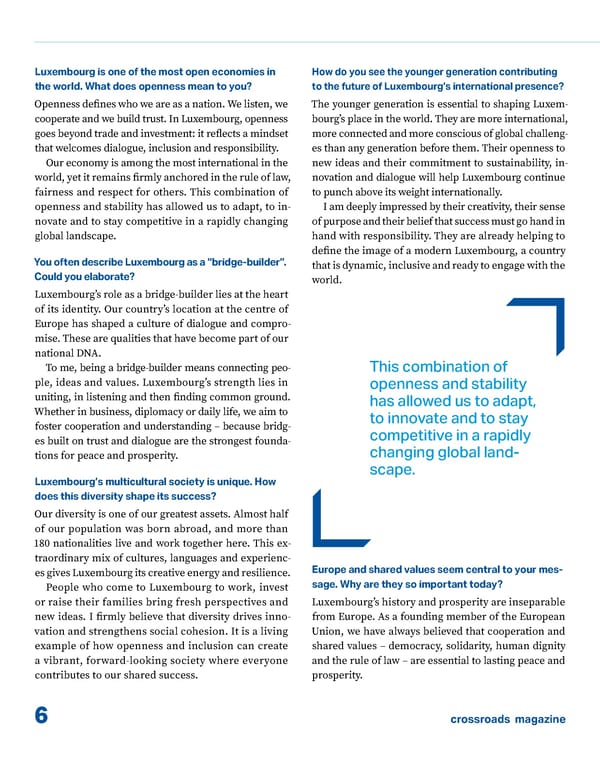
7 autumn2025 In today’s uncertain world, those values are more relevant than ever. Only a Europe built on trust and solidarity can protect our way of life and inspire confi- dence globally. Luxembourg will continue to advocate for dialogue and compromise – and for a strong, unit- ed Europe that stays close to its citizens and true to its principles. Looking ahead, what is your hope for Luxembourg’s next chapter? Our future will depend on our ability to stay open to ideas, to people and to the world. I am confident that Luxembourg will continue to thrive as a country that combines economic ambition with social cohesion and environmental responsibility. We have always succeeded by embracing innova - tion and change while staying true to our values. I be- lieve our next chapter will be defined by sustainable growth, inclusiveness and the strength of our commu- nity spirit. Together, we can build a future that hon- ours our past while opening new horizons for genera- tions to come. I will also continue to champion Luxembourg’s in- ternational economic outreach, building on my work of the past 25 years. Promoting our country as a hub for innovation, sustainability and responsible invest- ment remains one of my personal priorities. While my duties as Head of State may not allow me to travel as frequently as before, I intend to dedicate as much of my time as possible to supporting economic missions abroad and to strengthening Luxembourg’s global voice. At the moment, we are looking into how I can best continue this work, together with the government, with- in the context of my new responsibilities as Head of State. © Maison du Grand-Duc/Kary Barthelmey Grand Duke Guillaume and Grand Duchess Stéphanie A VISION FOR LUXEMBOURG
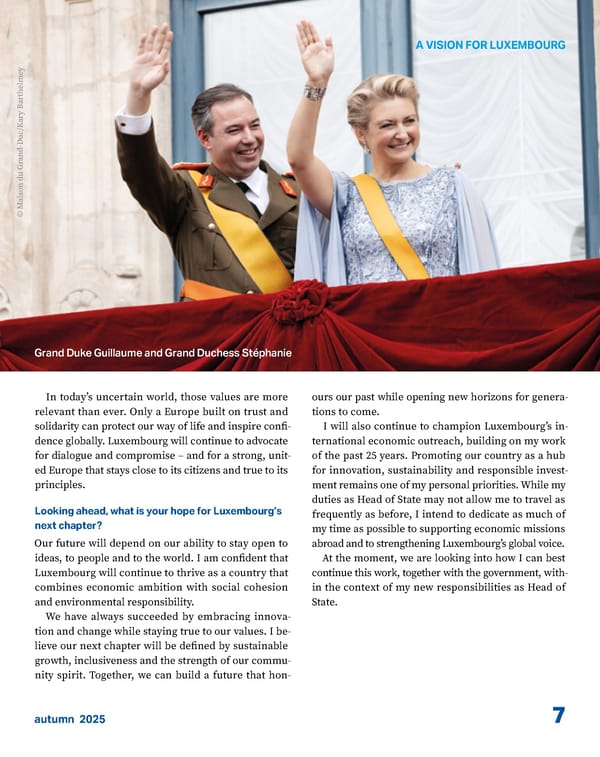
8 crossroadsmagazine Luxembourg likes to say it makes things possible. FM, the mutual insurer known for turning physics into practical risk reduction, has decided to make a lot happen in the small country: a European Science & Technology Centre, a growing research team and partnerships that directly plug into the country’s in- novation engine. Ground broken in March 2025, the centre will anchor work on climate hazards, indus- trial technologies and cyber for companies across Europe. “FM is a specialty company,” says Chief Science Of- ficer Louis A. Gritzo (in the picture). “We specialise in commercial and industrial properties. We’re an en- gineering-based, site-specific underwriter that uses science to inform our engineering and works with clients to reduce their risk.” In other words, FM’s researchers understand hazard and develop solutions and FM engineers assess sites, and provide risk reduction solutions. FM then insures the site for the remaining risk. That model shaped the European location search. “Initially, I assumed that Luxembourg was just a for - mality on our shortlist – we expected to choose a larger country like France, Germany or the Netherlands,” Mr Gritzo admits. But a visit hosted by Luxinnovation, the national innovation agency, changed minds: “We were able to talk to key senior government officials and re- search decision makers” on day one, evidence of an ecosystem geared to collaboration and speed. A space for real-scale experiments The decision is now concrete. In March 2025, FM launched construction of a 25–26k m², purpose-built facility in Luxembourg City, expected to open in 2027. It will house labs for real-scale experiments, an FM Approvals testing space for products used across EMEA, training rooms, client immersion areas and the com- pany’s European insurance operations – an “integrated facility” that brings science, engineering and client engagement under one roof. US-based FM is launching its European sci - ence hub in Luxembourg – not just to insure against risks, but to prevent losses before they happen and advance practical solutions in climate, industrial tech and cyber risks. BY ZUZA REDA-JAKIMA © FM
9 autumn2025 Research has already begun on temporary prem- ises while recruitment ramps up. “We’re growing our Luxembourg-based talent pool to serve the globe,” Mr Gritzo says. Talent availability – validated both by FM’s assessments and attracting researchers from across Europe – was a deciding factor. “People with different backgrounds see things differently, and that helps in a technical environment.” What will the team do? Mr Gritzo describes FM’s “three-legged stool”: (1) intelligence from what they see in the real world, (2) physics-based computation- al models, and (3) lab and full-scale experiments to ground models in reality. In Luxembourg, that means testing automation and robotics systems to under- stand failure modes (including cyber-induced failures), advancing climate science tailored to European per- ils, and turning all of this into practical guidance and standards used on client sites. Strategic partnerships Partnerships are the accelerator. In June 2025, FM and the Luxembourg Institute of Science and Technolo- gy (LIST) signed a strategic agreement to co-develop tools that help businesses anticipate climate- and cy- ber-driven disruptions, combining FM’s risk expertise with LIST’s strengths in digital twins (virtual models of real-world systems), Earth observation (satellite and sensing technologies to monitor the environment), ar- tificial intelligence (AI) and cybersecurity. Early flagship projects are expected to include a dig- ital-twin platform that integrates FM’s climate models to simulate cascading impacts (for example, how flooded roads can halt supply chains), as well as work on identifying cyber-attack pathways through com- plex industrial systems (analysing how hackers could access and disrupt interconnected operations). “Nothing drives risk reduction more effectively than seeing that risk in person and discovering how it can be prevented,” Mr Gritzo says. The new centre is de- signed for exactly that: clients will be able to observe experiments in Luxembourg and, via immersive links, watch large-scale tests happening simultaneously at FM’s other R&D facilities in Rhode Island, Massachu- setts or Singapore. Why now? Two forces influenced the decision, says Mr Gritzo: rapid digitalisation and a shifting climate. “Technolo- gy is coming out very quickly, posing new risks and opportunities to reduce risk. And we realised that the risks of natural hazards are changing because the cli- mate is changing.” Locating a research hub in Europe puts FM closer to EMEA clients and near a deep pool of scientific talent. Luxembourg, for its part, sees the centre as aligned with national priorities in research, innovation and sustainable development, with government leaders highlighting its alignment with the country’s climate resilience, cybersecurity and AI priorities. Luxinnova- tion’s hands-on role and “getting us to the right people at the right time,” as Mr Gritzo puts it, helped FM spin up quickly after pandemic delays. “We’ve been de- scribed as a great engineering risk-reduction company that also happens to write insurance.” In Luxembourg, that identity gets a European home and a bigger stage. COMPANY SPOTLIGHT Initially, I assumed that Luxembourg was just a formality on our shortlist – we expected to choose a larger country.
DISCOVER MORE
11 autumn2025 Understanding and adopting digital technolo - gies such as artificial intelligence is no longer optional – companies across almost every sector need to embrace them to stay relevant in today’s world. Rapid technological devel - opment challenges the business status quo, This ecosystem supports business creation, helping companies extract value from data, develop new products and solutions and explore innovative but also opens new pathways to success. To foster innovation and strengthen its po - sition as a leading European hub for digital innovation, Luxembourg is investing in a dy - namic, future-ready ecosystem built around three strategic pillars: business models. We delve into these topics on the following pages, so you are up to speed with the latest trends, devel - opments and opportunities. 11 autumn 2025 © Viviane Morelle
12 crossroadsmagazine Quantum technologies promise to solve problems currently beyond the reach of classical computers. While quantum computers are still under development, Silicon Valley-based SandboxAQ is already leveraging quantum technology to stay at the forefront of innovation. We spoke with Fernando Dominguez Pinuaga (in the picture), Vice President of Glob- al Outreach at SandboxAQ, about how the impact of AI is magnified when combined with the laws of quantum physics. How will quantum technologies take artificial intelli - gence to the next level? Fernando Dominguez Pinuaga: The public release of generative AI models such as ChatGPT was a break- through moment for humanity – but these tools have their limitations. Their capacity for producing texts and images is impressive, but in fact, they perform pure- ly statistical analyses of the data on which they have been pretrained. If you are looking for the key to curing Alzheimer’s, they won’t be able to help you because the answer isn’t something you can simply find online. Gen AI and Large Language Models (LLMs) have had an enormous influence on activities such as customer support and content creation; however, the real eco- nomic impact and expected transformation of areas like manufacturing, chemistry, finance and pharma- ceuticals require a different kind of model designed for quantitative tasks. To tackle such complex issues, AI must be capable of analysing physics, chemistry and biology – sometimes even at the atomic level – simulating lab work and mod- elling the world and its behaviour. This requires the combination of AI and quantum equations. At Sand- boxAQ, we work with large quantitative models (LQMs), which are trained on mathematics, biology and physics and provide the scientific accuracy and computational scale necessary to solve the most challenging problems. When working with diseases such as Alzheimer’s, we begin by using an LLM within the LQM to analyse all available information, including research papers, clinical trial results, data about genes and proteins, Artificial intelligence has already transformed the business landscape, but the next revolution lies in combining AI with quantum technologies. BY LENA MÅRTENSSON © Nexus Luxembourg/Pancake! Photographie
13 autumn2025 and drug compounds or experiments that have been tried so far. Next, we ask the LQM to synthesise the information, identify the most promising compounds – searching the broadest possible chemical space – and simulate their specific behaviours. The goal is to find novel drug compounds that have the best potential for success with the least amount of side effects. Then we run those potential solutions through the LQMs again, combining them with knowledge graphs and AI techniques. Ultimately, we use chemical equa- tions to analyse how the final candidates will behave in the real world. This approach allows us to identi- fy successful candidates at a rate 40 to 50 times faster than traditional methods. In what fields do you think that the combination of AI and quantum will have the most significant impact? Drug development is definitely a critical area. Today, it can take 12-15 years and $2-4 billion to create a new drug, and the failure rate is around 90%. If we can reduce the process to five years and increase the suc- cess rate using LQMs, AI simulation and other tech- nologies, we are talking about a real revolution. This approach is already delivering significant develop- ments in Alzheimer’s, Parkinson’s and cancer drug research. In addition to our work with the biopharma in- dustry, I’m also very excited about what can be done in chemistry using similar technologies and techniques. We are currently involved in the devel- opment of new advanced materials, alloys, chem- icals, battery chemistries and catalysts for use in aerospace, automotive, defence, energy, and other industries. We’ve even used LQMs to calculate the energy required to break down several PFAS mol- ecules – so-called “forever chemicals”. Other areas where our expertise in AI and quantum intersect include advanced medical diagnostics, encryption management and cybersecurity (required to imple- ment post-quantum cryptography) and magnetic navigation to combat the growing global challenge of GPS jamming and spoofing. Post-quantum cryptography is particularly interest- ing for Luxembourg. I think its innovative financial ecosystem may have the potential to become the first one in the world to be fully quantum resilient. LQMs can also be applied to financial modelling, risk mitiga- tion, fraud detection and more. What is the key for companies such as SandboxAQ to remain at the cutting edge of AI and quantum? Our AI-native talent is paramount. In the past, you ei- ther studied biology or IT, so you operated in two sep- arate worlds, and this is still how most companies work. However, at SandboxAQ we look for a new generation of multi-disciplinary individuals who have studied both computational biology, chemistry or physics and AI or quantum at top universities. By combining the right tools, they can solve problems in days or weeks that would tra- ditionally take months or years or even decades. LQMS DRIVE DISCOVERY AND IMPACT ACROSS THE WORLD’S LARGEST INDUSTRIES LLM REACH AI FOR LANGUAGE & GRAPHICS MEDIA BIOPHARMA/ DIAGNOSTICS AUTO/ AEROSPACE SOFTWARE FINANCIAL SERVICES CHEMICALS, MATERIALS, ENERGY LQM TERRITORY AI FOR PHYSICS, CHEMISTRY, BIO & FINANCE Portfolio management Airplane navigation Medical diagnostics Battery chemistry Novel drugs Robotics DATA, AI AND QUANTUM © SandboxAQ
14 crossroadsmagazine Luxembourg provides an integrated, interoperable and resilient ecosystem for digital innovation and scaling in the European market. Over the past few decades, the country has cultivated a thriving digital network designed to provide companies with the tools they need to succeed. For a nation to remain at the forefront of digi - tal innovation, it must rapidly adopt emerging technologies, continuously upskill its work - force, and ensure access to world-class ex - pertise. It’s precisely what Luxembourg does. BY LENA MÅRTENSSON Resilient and secure digital infrastructure Luxembourg leads in digital connectivity and secure data hosting, boasting Europe’s first national sovereign cloud and geographically highest concentration of ultra-secure data centres. Companies have full access to historical Earth observation data from the EU’s Copernicus programme, relevant across multiple sec- tors. Further data sets signif- icant to businesses will be mapped shortly. The country’s unique, busi- ness-oriented supercomputer MeluXina, is widely used by startups and corporations alike. High-value services for companies Several initiatives ensure that this infrastructure and expertise are readily available to businesses. Supercomputing Luxembourg provides hands-on onboarding and expertise to companies utilising MeluXina, while the Luxembourg AI Factory sup- ports AI implementation, from initial steps to full deployment. The pioneering Luxembourg National Data Service (LNDS) facilitates the sharing and reuse of public sector data in a reliable manner, enabling the creation of value from secondary data. Luxembourg’s true differenti- ator lies in how these assets are integrated. Services offered by different stakeholders are inter- operable and complementary, enabling businesses to utilise and benefit from them quickly and efficiently. Top-level expertise Luxembourg’s public research institutions are internationally recognised in fields such as artificial intelligence, data analytics and cybersecurity. The Luxembourg Institute of Science and Technology (LIST) notably researches explainable AI and unbiased large language models, while the Universi- ty of Luxembourg excels in security, autonomous systems, fintech and space systems. The university fosters skills development through master’s programmes in fields such as data science, high-per- formance computing, and molecular and computational biomedicine. With 75% of its workforce being foreign nationals, Luxembourg is also a magnet for global talent. 14 crossroads magazine
15 autumn2025 Accelerating AI and quantum innovation Luxembourg acts as a “living laboratory” for AI, pro- moting responsible applications tailored to local prior- ities. By federating all its stakeholders around a com- mon goal, it aims to become a nation-sized proof of concept demonstrating AI’s transformative potential. Luxembourg also serves as a testbed for companies developing scalable AI solutions for larger markets. A key component of the AI ecosystem is the upcom- ing MeluXina-AI supercomputer. Launching in mid- 2026, it will be purpose-built for AI workloads and offer the resilience and data protection required for sensitive and highly regulated sectors. It will be com- plemented by MeluXina-Q, the national quantum com- puter, which is also expected to become operational in 2026. Together, they will form a hybrid high-perfor- mance computing ecosystem accessible to both com- panies and researchers. A safe haven for sensitive data A distinctive characteristic of Luxembourg is the state’s active role in shaping the digital future. It strategically funds and supports key initiatives such as high-perfor- mance computing and sovereign cloud services. This long-term vision, closely tied to Luxembourg’s politi- cal and societal stability, fosters trust and confidence rarely matched elsewhere. The need for resilience and data security permeates virtually all infrastructure and services. The MeluXi- na supercomputer, for example, is one of the few – if not the only – such machines globally hosted within a top-level Tier IV data centre, which guarantees an ex- ceptionally high standard of security. Building bridges across borders As a central European hub with a strong cross-border orientation, Luxembourg serves as a strategic service point for data sharing among EU member states. It also functions as a gateway to Europe for non-EU players. The country plays an active role in initiatives such as GAIA-X, which aims to create an open, secure and sovereign European data infrastructure to promote the interoperability of data, and CLINNOVA, an inter- national research project advancing precision medi- cine through data federation, standardisation and in- teroperability. With its integrated strengths, forward-looking vision and steadfast commitment to trust and excellence, Lux- embourg stands out as the ideal launchpad for digital innovation and scalable success across Europe. DATA, AI AND QUANTUM © LuxProvide & EuroHPC
Luxexpo, Luxembourg June 10 — 11, 2026 www.nexusluxembourg.com Premium Institutional Partners
DATA, AI AND QUANTUM Three complementary government strategies published in 2025 aim to solidify Luxembourg’s position as a European digital innovation hub. Luxembourg is committed to creating a trusted AI ecosystem based on openness, dynamism and reliabil- ity. This ecosystem will ensure that technological ad- vancements palpably improve the quality of life for cit- izens and encourage the adoption of AI technologies across the entire economy by continuing to deploy cutting-edge infrastructure and foster a skill-based ecosystem. The government also intends to promote intelligent and efficient processes and personalised, inclusive public services. It will continue to build a research ecosystem that positions AI as transversal and inter- disciplinary, driving innovation, and attracting inter- national and developing national talent. Beyond enabling new scientific breakthroughs, the strategy focuses on developing, deploying and commer- cialising innovative quantum technologies, capabilities and services. Building on Luxembourg’s role as a trust- ed and secure hub for data-driven innovation, the strat- egy places particular emphasis on quantum communi- cation and cybersecurity. One key objective is to equip public and private stakeholders with tools to safeguard critical systems against quantum-based threats. In parallel, the country seeks to expand on its existing strengths in high-performance computing and AI, lev- eraging the disruptive potential of quantum comput- ing to accelerate industrial transformation and main- tain technological competitiveness. To achieve this, the Luxembourg government takes on the role of a pio- neer in data management, establishing centralised governance to simplify access, use and reuse of public sector data. This framework benefits both public and private entities, nationally and internationally. Ultimately, the government intends to create a “data factory”, which will develop an ecosystem for data valorisation based on the provision and repurposing of ready-to-use information, enabling the creation of accessi- ble and interoperable data products and services. Be a European data hub for reliable, high-quality and easily exploitable data. Become a renowned hub for human-centred AI innovation with a global impact. Make Luxembourg ready to harness the full potential of quantum technologies for scientific, technological and economic progress. 17 autumn 2025
18 crossroadsmagazine A thriving AI ecosystem Luxembourg is home to a diverse community of start- ups, corporates, research centres and public institu- tions developing responsible and impactful AI solu- tions. A recent mapping by Luxinnovation, the national innovation agency, covers 568 entities – including tech- nology providers, solution developers, potential data holders, innovative users, support networks and inves- tors – engaged across the entire AI value chain. The mapping shows that 80% of these entities were founded within the past 10 years, highlighting a surge in AI entrepreneurship driven by Luxembourg’s sup- portive environment. Nearly half of the companies developing AI-driven solutions focus on IT and cyber- security as well as the finance and insurance sectors – areas that reflect the country’s economic strengths. A robust support system of consultancy firms, research institutions and a dynamic investment community bol- sters the growth of AI in Luxembourg, and it is expect- ed that the number of companies offering high-quality AI solutions will continue to grow dynamically. Luxembourg enters into partnership with Mistral AI The Luxembourg government signed a partnership with Mistral AI as part of its goal to position the coun- try as a world leader in the sovereign data economy. “To remain a modern country and to be a leader in certain areas, you need to embrace AI – and AI has to go together with a sovereign data economy,” said Prime Minister Luc Frieden at the Nexus Luxembourg tech event in June 2025. Founded in France in 2023, Mistral AI’s mission is to democratise AI through open-source, efficient and innovative models, products and solutions. The com- pany founders say they envisioned a different, auda- cious approach to artificial intelligence: “to challenge the opaque-box nature of ‘big AI’, and make this cut- ting-edge technology accessible to all”. “We are talking about a technology that will drive multiple digits of GDP and influence many strategic areas, including defence,” said Arthur Mensch, CEO of Mistral AI. “When deploying such technology – par- ticularly in critical infrastructure – you must ensure that you hold the keys to turn it on and off.” The partnership will support the implementation of artificial intelligence across multiple sectors, including priority fields such as health, space and finance. The gov- ernment has also foreseen close cooperation between Mistral AI and the Luxembourg Armed Forces to further integrate advanced AI tools into military activities. In addition, the cooperation aims to accelerate AI adoption within the public sector and foster collabo- ration with public research institutions. The research areas are wide-ranging, and the ultimate goal is to en- sure a tangible societal impact. 18 © Luxinnovation/René Garcia
19 autumn2025 Google chooses Luxembourg for Centre of Excellence Global technology leader Google has selected Luxem- bourg to open its new centre of excellence as well as a hub for AI transformation. The Centre of Excellence (CoE) will be hosted by the Interdisciplinary Centre for Security, Reliability and Trust (SnT) at the University of Luxembourg. “This partnership is not restricted to today’s technologies but anticipates tomorrow’s developments and their impacts,” said Prof. Yves Le Traon, director of SnT at the University of Luxembourg. The CoE will enable SnT to enhance its research in digital sovereignty and increase awareness of technol- ogies with a significant societal impact. “The estab- lishment of the CoE is the beginning of a transforma- tive partnership between Google and the University of Luxembourg,” said Minister for Research and Higher Education and Minister for Digitalisation Stéphanie Obertin. In parallel to the CoE, Google’s newly opened office, will provide skills training, build a strong local eco- system of partners and startups, enable customers to fully leverage cloud and AI solutions, and accelerate cloud solutions adoption. “Luxembourg is a vital centre of innovation, and Google Cloud is proud to partner in its ongoing digi- tal transformation,” said Anthony Cirot, Google Cloud EMEA South. “Through our expanded presence and initiatives, we aim to empower Luxembourg’s busi- nesses and citizens to harness the power of technology, foster innovation and build a thriving digital future for the nation.” DATA, AI AND QUANTUM 19 Leaders need first to understand AI By Emmanuel Vivier, co-founder of HUB Institute Artificial intelligence is poised to transform busi- ness as profoundly as the steam engine did dur- ing the 19th-century industrial revolution. Over the next 5-10 years, AI advancements – especially in generative AI and machine learning – will un- lock unprecedented strategic and operational op- portunities for companies worldwide. We will see new business models, revenue streams and ave- nues for market differentiation, while technology will enable cost optimisation, productivity gains and automation. Despite billions invested and rapid technologi- cal progress, many large companies still struggle to scale AI effectively. The main barriers aren’t technical – they’re organisational. Issues such as outdated culture, unclear processes, poor govern- ance and a lack of skills are often to blame. You cannot support what you do not under- stand. Before driving change across an organisa- tion, leaders must first internalise it themselves. No transformation can succeed without direction – and leadership begins with personal conviction, knowledge and decisive action. This is why CEOs and top managers must be at the centre of this process. © HUB Institute
20 crossroadsmagazine AI models running directly on local devices, such as drones or industrial robots, not requiring a constant in- ternet connection or cloud access, offer many advantag- es. To start, sensitive data remains on the device, reduc- ing exposure to breaches or misuse; it is also easier to comply with data protection laws. Additionally, results are delivered instantly, with no latency from cloud com- munication, and AI features remain functional even without internet access. Operating offline also helps reduce data transmission costs and the higher energy consumption typically associated with cloud computing. “This is a major trend that we will see expanding over the next 5-10 years – but our technology is already here,” says Ben Kim (in the picture (R) with Daniel Park, CTO), Head of Business Development at Data De- sign Engineering (DDE). Founded in Seoul in 2014, the company introduces on-edge device offline AI tech- nology, embedding AI models within robots and un- manned equipment for autonomous operations, even when offline and in GPS/GNSS-denied environments. While many other AI devices that function without cloud access still require a connection to a local server via Wi-Fi or 5G, DDE’s technology is fully autonomous. Utilising compressed large multi-model AI systems, it supports real-time decision making, planning and hu- man interaction without cloud or network reliance. DDE’s intelligence on-edge device offline AI technol- ogy recently won the first Luxembourg AI Excellence Award in the category “AI Innovation Excellence”. Achieving full AI autonomy DDE arrived in Luxembourg in 2022 with the vision of expanding into the European market and beyond. A meeting with the CEO of a Luxembourg-based ul- tra-lightweight technology specialist company, Gradel, opened DDE’s eyes to the opportunities Luxembourg offers to innovative businesses. “Gradel became our first client and a close partner, and we discovered a place where the government actively promotes opportunities, supports cooperation among Originally from South Korea, Data Design Engineering is pushing the boundaries of the highly innovative offline, on-device technology from its HQ in Luxembourg. BY LENA MÅRTENSSON © Luxinnovation/Capsule
21 autumn2025 omous decisions, such as real-time collision avoidance. Dobby also interprets voice commands accurately and adjusts the robot’s actions accordingly. This tech- nology is notably deployed in industrial robots oper- ating in highly sensitive environments, as well as in the company’s latest innovation: a smart, autonomous chair that can be moved with voice instructions. The European interest in DDE’s technologies is grow- ing rapidly. On the local level, in addition to the private industry, the company is working in various sectors such as manufacturing, space, railway and defence. Riding on this momentum, DDE decided to transfer its global headquarters to Luxembourg in 2025. “While business opportunities abound globally, a key reason for this decision is the outstanding support we have received from the Luxembourg government and the local business community,” says Mr Kim. “People are kind and welcoming, and in business, they always aim for a shared victory. We are definitely here to stay.” companies and helps in the international business de- velopment,” says Mr Kim. He regularly participates in international trade missions and visits to leading trade fairs organised by the Luxembourg government and the Chamber of Commerce, which offer excellent opportu- nities to establish new business relations. A significant challenge of offline on-device AI is the need to compress large AI models to run efficiently on limited hardware – a challenge that DDE has already overcome. All its AI models are fully developed in-house, which means that the company can lightweight, optimise and compress them sufficiently for powerful AI func- tionalities to run locally, even on compact chips that are considerably more affordable than those typically used. Growing European demand DDE has also developed “Dobby”, an on-device AI assis- tant tailored for edge device technology, which enables robots and vehicles to operate offline and make auton- Cebi International Predictive AI-based operational digital twin Electromechanical component producer Cebi International re- ceived the “AI for Industry Excel- lence” award for its digital twin. It integrates real-time data from production, energy, mainte- nance and quality, helping teams anticipate issues and optimise efficiency. Initiated by FEDIL – The Voice of Luxembourg’s Industry, the AI Excellence Awards honours bold innovative projects, significant technological breakthroughs and concrete applications of AI for the benefit of the econ - omy, society or the environment. DDE’s co-laureats include: Fischer AI-enhanced order management The bakery chain Fischer won the “AI Adoption” award for its AI-based order recommendation system, which predicts daily demand and recommends optimal order quantities for each product and point of sale. Initial results show a 4% in- crease in sales and a 1.5% reduc- tion in waste. Luxscan Technologies AI vision systems for the pri - mary transformation of wood The “AI for Sustainable Business” was awarded to Lux- scan Technologies for its AI-en- hanced wood scanner. By combining traditional scan- ning hardware with deep learning models, it detects, segments and classifies wood features with un- precedented speed and precision. DATA, AI AND QUANTUM 21 autumn 2025
22 crossroadsmagazine Luxembourg is small in size but big in impact. Its mix of openness, innovation and quality of life has turned the country into one of Europe’s most attractive places to live, work and do business. These figures highlight why Luxembourg continues to attract companies and talent. An open economy is Luxembourg’s calling card. It is deeply outward-looking, built on the free movement of goods, services and ideas. in the world for trade openness international non double taxation agreements withholding tax in repartition of profit for foreign investors lowest standard VAT in the EU per capita in the European Union (€759) goods & services exported Luxembourg Chamber of Commerce World Bank, 2023 Luxembourg has developed a competitive, business-friendly tax framework that supports cross-border investment and growth. From space resources to research intensity, it is a hub for forward- looking ideas and ventures. country in the world to adopt a legal framework for space resources incubators, accelerators and innovation hubs Eurostat crossroads magazine
23 autumn2025 destinations with direct flights in Europe, Asia and Africa education system, with a wide choice of well-respected international schools of the EU’s GDP can be reached within just 1 trucking day available throughout the country Luxembourg’s workforce stands out for pro- ductivity and diversity. Highly skilled, multi- lingual and globally oriented, its people are the driving force behind the country’s growth. Beyond business, Luxembourg invests in a connected and inclusive society that makes everyday life easier and more accessible. IMD World Talent Ranking 2025 international and multilingual population in the EU Luxembourg’s strategic location places it at the centre of Europe’s largest markets, with excellent connectivity by land and air. Luxembourg 1H by plane Frankfurt 2H by car Brussels 1H by plane London 1H by plane Amsterdam million consumers in 27 countries uniquely THE COMPASS autumn 2025 for attracting talent globally 2H by train Paris 23
24 crossroadsmagazine Over the past 15 years, AI has become firmly embed- ded in healthtech, particularly in radiology. “Decision-support tools in radiology primarily rely on computer vision,” Jan Beger explains. “These tools often use so-called narrow AI models that have been trained to detect one specific condition and alert the ra- diologist when needed. But we’re now entering a new era, with technologies capable of much more holistic, far-reaching impact.” At the forefront of this shift are foundation models – AI neural networks trained on vast volumes of raw data, enabling them to be applied across a wide array of use cases. “Radiologists don’t look at images in isolation,” says Mr Beger. “They interpret them in context, drawing on lab results, patient history and other clinical data. Foundation models can do something similar – ingest- ing diverse data types and reasoning across all of them. It brings us closer to AI that can operate more like a clinician. That’s truly exciting.” Making sense of multimodal data Healthcare systems must handle a vast array of data types ranging from structured lab results and diagnos- tic images to free-text clinical notes and even handwrit- ten observations. “This diversity presents a challenge, but also a major opportunity. With the latest generation of AI technologies, we can leverage and derive mean- ing from multimodal patient data. It’s a game-changer.” Mr Beger also highlights that artificial intelligence has a role to play in bridging the communication gap between clinicians and patients. “Medical reports can be overwhelming. AI can help translate jargon into clear, patient-friendly language, even responding in an empathetic way.” Opportunities in healthtech These advances are creating a wave of opportunity, not just in terms of new AI-driven health products, but also for enhancing internal business operations. “Artificial intelligence will influence many areas of our How is AI driving innovation in digital health, and what does it take to succeed? We spoke with Jan Beger, Global Head of AI Advocacy at GE Health- Care, to find out. BY LENA MÅRTENSSON © GE HealthCare
25 autumn2025 work, and over time, it will support employees in vari- ous functions throughout the company. Every compa- ny should begin this journey, and if you haven’t already, start tomorrow. There’s no time to waste.” Of course, the path is not without its challenges. “Using cutting-edge AI is relatively expensive and requires in- vestment,” Mr Beger cautions. “And we are operating in a highly regulated industry, where getting approval for AI-enabled medical devices is no small feat.” Keeping pace is another concern, with major AI breakthroughs happening weekly. “Today’s latest re- search might be outdated in six months. This makes choosing the right technology tricky. Smaller compa- nies may want to consider partnerships rather than trying to build their own models from scratch.” Putting the human back into healthcare While AI opens up exciting business opportunities and creates economic value, Mr Beger sees its most significant promise in restoring the human element of care. “Let AI handle the routine, so that healthcare professionals can focus on delivering the extraordi- nary,” he says. “We need to bring the human touch back to healthcare.” Let AI handle the routine, so that healthcare professionals can focus on delivering the extraordinary. DIGITAL HEALTHTECH 25
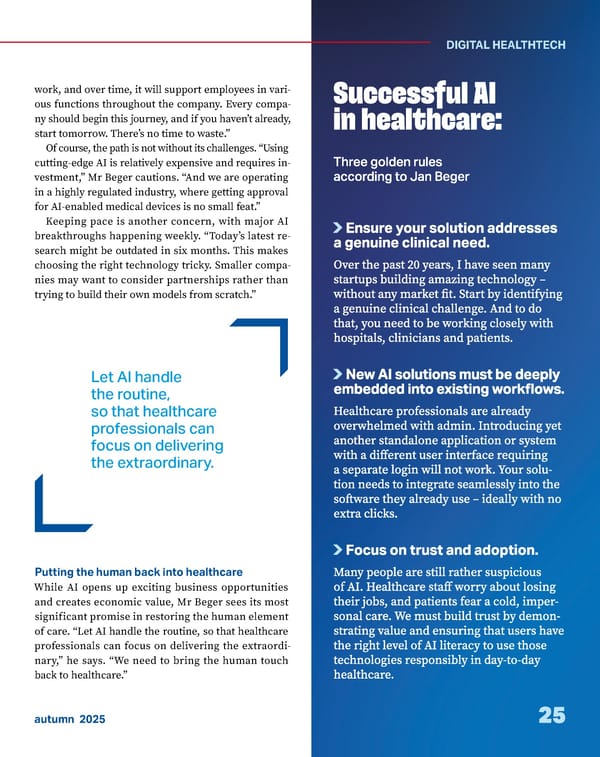
26 crossroadsmagazine Digital health technologies are transforming the way we diagnose, treat and prevent illnesses. In Luxembourg, healthtech innovation and market penetration are a strategic priority. BY LENA MÅRTENSSON Digital health technologies are driving a profound trans- formation of healthcare, reshaping practices that have re- mained essentially unchanged for decades. “Healthtech in- novation is enabling the transition from a curative approach to preventive, precise and personalised medicine,” confirms Françoise Liners (in the picture), Director of Health Technol - ogies at the Luxembourg Ministry of the Economy. This personalisation of care is made possible by digi- tal tools that provide data-driven insights, enabling doc- tors to make more precise diagnoses and recommend treatments tailored to the specific conditions of each patient. They also help identify potential health issues at an earlier stage and suggest preventive measures. Digital technologies also help healthcare organisa- tions become more efficient – a crucial move as many countries across the globe face an increasing shortage of medical staff. “Offering all patients access to per- sonalised medicine with fewer resources is a complex challenge, but digitalisation can lead to a sustainable solution,” says Dr Liners. She points out that the integration of artificial in- telligence in health technologies, products or servic- es accelerates the transformation further. “This isn’t merely a trend – it’s a revolution that should be hu- man-centred.” Building trust in digital health The transition of the healthcare systems towards per- sonalised medicine was already at the centre when the Luxembourg government selected health technolo- gies as one of the pillars for economic diversification nearly two decades ago. In addition to generating eco- nomic value and jobs, the ambition was to have a pos- itive impact on the Luxembourg society. A dynamic community of healthtech companies has emerged as a result, focusing particularly on medical devices, in vitro diagnostics and digital health. © Luxinnovation/Capsule
27 autumn2025 “These fields are essential for enabling personalised medicine,” Dr Liners points out. However, having good digital health tools is not enough to make it happen. “We must consider the readiness and willingness of health- care professionals and patients to use, adopt and find such technologies useful, including those that AI fuels. This is essentially a matter of trust.” Navigating new EU regulations To ensure that digital health tools can be trusted and that personal data is handled with care, the European Union has recently adopted several new regulatory frameworks complementing general legislation on personal data pro- tection. Those impacting healthtech innovators include: European Health Data Space (EHDS) Set up to create a secure and harmonised frame- work for the exchange and use of electronic health data across EU member states. It facili- tates the primary use of health data for better individual healthcare, as well as the secondary use for research, innovation and policy-making. AI Act The AI Act provides compliance requirements for AI applications depending on their risk levels. AI-enabled medical devices, which are considered “high-risk”, need to comply with additional requirements for transparency, data management, ethics and human oversight. Medical Device and In Vitro Diagnostics regulations also set rules and processes to ensure that digital health technologies or products with a medical purpose are safe and effective for patients. From compliance to competitive advantage Navigating the regulatory landscape may be complex, but it is necessary for businesses targeting the Euro- pean market. “My recommendation is to embrace the regulations and understand that compliance provides value and helps build user trust,” says Dr Liners. Lux- embourg has implemented several measures to help healthtech companies achieve compliance with regu- lations from the outset. DIGITAL HEALTHTECH © Luxinnovation/Capsule Jean-Philippe Arié and Françoise Liners
28 crossroadsmagazine The healthtech track of the renowned startup accel- erator programme Fit 4 Start, open to both local and international participants, raises companies’ regula- tory awareness from day one. It helps them take re- quirements into account from an early stage, rather than discovering them once the solution is finalised and having to redevelop all or part of their solution to achieve the necessary compliance. A second programme, Fit 4 Innovation – Healthtech Market, provides healthtech startups established in Luxembourg with access to specialised expert consult- ants who can help them define their regulatory roadm- ap for an EU market launch. Luxembourg’s strategic investment Another priority for the Luxembourg government is to foster innovation by facilitating companies’ access to high-quality standardised health data in a secure, federated and interoperable manner. Health data use cases such as the patient cohorts of the National Cen- tre of Excellence in Research on Parkinson’s disease and those set up under the international project focus- ing on personalised medicine of specific inflammato- ry diseases, demonstrate Luxembourg’s strong capa- bilities in setting up key data processing environments. Deriving insights and developing new applications from large amounts of health data requires consider- able computing power. Companies can rely on Lux- embourg’s business-oriented high-performance com- puter MeluXina, which is soon to be complemented by a second supercomputer purpose-built for AI and a quantum computer. “These are major investments, also supported by Eu- ropean funding,” underlines Dr Liners. “They testify to Luxembourg’s commitment to becoming by 2030 one of the leaders in the sovereign data economy, in Europe but also globally. By catalysing innovation, these investments will also contribute to positioning the country as a European healthtech hub for the de- velopment, evaluation and adoption of digital health technologies in the European market.” BEYOND THE BAND-AID © Qatar Financial Centre © pharma.be crossroads magazine
29 autumn2025 What opportunities will the EHDS bring to the pharma industry? Until now, pharma companies have often had to set up their own systems to collect real-world data from sources such as reimburse- ment claims, patient-reported outcomes, disease registers and mobile health applications. We anticipate that the EHDS will fa- cilitate our access to such data. By making much larger datasets available, the EHDS will also drive the development of AI tools that will become more accurate and useful for healthcare professionals. According to the EHDS, data holders must make a wide range of data available to other players for permitted secondary use. Do you see this requirement as a potential threat? It can for sure be an issue, but data holders will be able to indi- cate which data is sensitive due to intellectual property rights or trade secrets. If their classifi- cation is confirmed, health data access bodies will restrict access to the specific data. Do you think this obligation could discourage international pharma companies from conducting R&D in Europe? No, I doubt that. The situation to- day is more complicated and the data more fragmented than it will be after the introduction of the EHDS, yet it still doesn’t prevent the pharma industry from con- ducting research here today. The EU is an attractive market, and using data from European pa- tients is required for market entry. I expect the EHDS to improve the situation for real-world data-driv- en studies and treatments. Should AI be regulated? We should regulate how AI technology is used, as well as the activities of technology providers – not the technology itself. AI tools must be explainable, unbiased, and grounded in accurate data. But regulations should not be allowed to hamper technological progress. Regulators also need to consider the different types of AI, including predictive AI, generative AI, and AI based on large or small language models. You cannot just regulate everything in the same way. Do you think the EU is going in the right direction with its AI Act? Europe often leads the way in reg- ulation, which is understandable given the EU’s composition of 27 member states seeking harmoni- sation and a level playing field. In my opinion, the work on the AI Act began with the right intention, but it has arguably become overly regulated. Europe needs to en- sure it maintains its competitive advantage. However, it is not too late to revise it, and I admire that Europe- an regulators are always easily ap- proachable and open to feedback. How should regulation and innovation intertwine? Regulation is necessary for con- sumer protection, accountability and maintaining ethical stand- ards. However, to prevent it from hindering innovation, I recom- mend starting with guidelines such as sandboxes providing secure environments for testing AI solutions. This is the approach we adopted in Qatar. DIGITAL HEALTHTECH 29 autumn 2025
Learn about some of the international companies that have recently incorporated in the Grand Duchy and their reasons for choosing Luxembourg. We look forward to opening our office in Luxembourg and en- gaging more deeply with our suppliers across Europe. We chose the country for its significant investments in the space sector, its central location, as well as the government’s support for our long-term vision. David Limp, CEO of Blue Origin Blue Origin Space technologies United States It simply makes sense to be in Luxembourg. In addition to being business-friendly and multicultural, it is strategically located at the crossroads of several countries where we want to do business. The place is buzzing with business energy, and the ecosystem is truly exciting. People here are working together instead of fear- ing competition. Geoffroy Morgan de Rivery, CEO of Brixio Brixio Cloud and cybersecurity Singapore Luxembourg offers a supportive and business-friendly envi- ronment. Businesses are seen as essential building blocks of the economy, and the country actively encourages growth and in- novation. It also provides access to advanced digital infrastruc- ture and is strategically positioned in the heart of Europe, mak- ing it ideal for WEDOS’s international growth. Josef Grill, founder of WEDOS WEDOS IT infrastructure Czech Republic We were truly impressed by Luxembourg’s commitment to digital- isation. We also saw that the support we would receive here was considerably more extensive than in other countries. I have not seen elsewhere the level of cooperation between the government and other stakeholders, acting as one team, to attract foreign com - panies. They treat us as if we were a local business. Donghun Lee, CEO of Code.presso Code.presso Skills assessment and management South Korea For us, Luxembourg is the gateway to Europe. The solid infra - structure and high-capacity network are a huge advantage when leveraging technologies like AI. What’s more, you don’t need to be a large or well-known company to make an impact here. We are just 140 people, but this means that we can be nimble, agile and efficient. Sathish TK, CTO of IQZ Systems IQZ Systems Technology consultancy United States We opened the HQ in Luxembourg because there’s an obvious possibility for expansion into Europe, and America as well. The country’s central location in Europe, proximity to key markets including France and Germany, and supportive business envi- ronment solidified our decision. Nico Bery, co-founder and CEO of Flylab Flylab Agritech Thailand I was amazed by the level of support received. On my second visit to Luxembourg, a meeting was organised with people from the gov- ernment and other stakeholders, who actively listened to my needs and connected me with a network I needed. Luxembourg is also an excellent testbed for me. People here move much faster than other Europeans and are very positive to AI and new technologies. Wonseop (Sean) Lee, CEO and founder of SafeAI SafeAI AI-driven safety South Korea 30
26-27 March 2026 EUROPEAN DIGITAL HEALTHTECH CONFERENCE #DigitalHealth #Innovation #AI Luxembourg City Spring 2026 SCYNERGY #Quantum #AI #HPC #Supercomputing Luxembourg City 10-11 June 2026 NEXUS LUXEMBOURG #Tech #Innovation #AI Luxembourg City October 2026 LUXEMBOURG VENTURE DAYS #Startups #Scaleups #Investors #VC Luxembourg City Director of publication Cécile Lorenzini Editor-in-chief Lena Mårtensson Contributors and coordination Zuza Reda-Jakima Océane Gotté René Garcia Consulting and production pink not red Pictures, videos and audio Capsule Printing Reka print+ Crossroads Magazine is published by Luxinnovation. © 2025 Luxinnovation. All rights reserved. Any reproduction or adaptation, either partial or total, is strictly prohibited without the express written authorisation by Luxinnovation. Subscribe to our Crossroads newsletter Stay ahead with insights, success stories and opportunities from Luxembourg. Follow us on LinkedIn Join our community and discover how Luxembourg empowers global business. Learn more and get in touch Explore how we can support your expansion into Europe. Luxembourg is a strategic gateway to the European market and a thriving hub for innovation and international business. Whether you are a startup or a global enterprise, Luxembourg Trade & Invest is your trusted partner – offering tailored support, curated onsite visits and direct access to key decision-makers. Let’s grow together.
